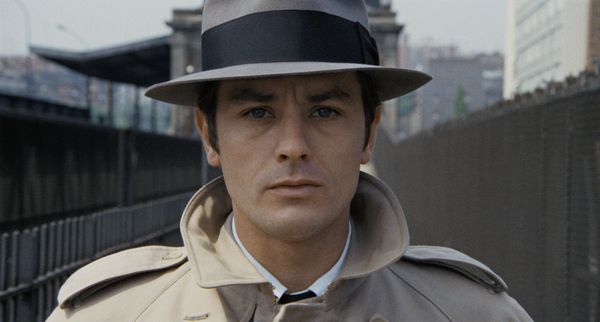 |
| Alain Delon in The Samouraï: 'The mysteriously lethal angel in a trench-coat and a fedora' Photo: Criterion Collection |
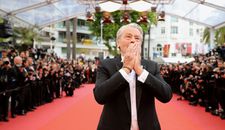 |
| On the red carpet at the Cannes Film Festival in 2019 when he was awarded at honorary Palme d’Or Photo: Richard Mowe |
Despite their differences the three children and other family members were at his bedside when, according to a statement relayed by the news agency Agence France Presse he passed away “peacefully.”
The row has echoes of Delon’s own family background. Born on the outskirts of Paris in 1935 he was abandoned and, aged four, left with a foster family when his parents divorced. He was rebellious youth, eventually joining the Navy to see action in Indochina. When he returned to Paris in the late 1950s he lived on the margins until he broke into the film world, partly as a result of his magnetic good-looks and physique. Initially he found work in Paris as a porter and waiter, striking up friendships with aspiring young actors among them Jean-Claude Brialy who introduced him to the director Yes Allégret who offered him his first role in the 1957 feature, Send A Woman When The Devil Fails (Quand La fFmme s’en Mêle) with Edwige Feuillère.
Delon became globally recognised in particular for his work with New Wave director Jean-Pierre Melville in such gangster themed films as Le Samouraï; Le Cercle Rouge, and Un Flic earning him frequent comparisons with American icon James Dean. Other significant roles were in René Clément’s Plein Soleil (Purple Noon) (a Patricia Highsmith adaptation of The Talented Mr Ripley); Luchino Visconti’s Rocco And His Brothers and The Leopard; Michelangelo Antonioni’s L’Eclisse; José Giovanni’s Two Men In Town and Joseph Losey’s Mr Klein. There was a memorable turn in Henri Verneuil’s thriller Mélodie en sous-sol which paired him with Jean Gabin. Demonstrating an ability to always bounce back, he was also adeptly employed by Jean-Luc Godard in 1990 as polar opposite twins in Nouvelle Vague.
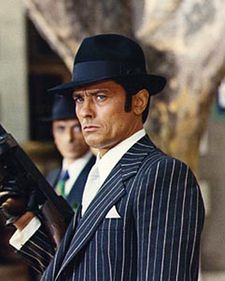 |
| Alain Delon in one of his iconic gangster poses in Borsalino Photo: UniFrance |
When he received an honorary Palme d’Or at the Cannes Film Festival in 2019 he was quick to credit the women in his life for persuading him to take up a career in cinema. He suggested it had all happened “by accident”. He first came to Cannes in 1956 with an actress friend Brigitte Auber for the Alfred Hitchcock comedy-thriller To Catch A Thief with Cary Grant and Grace Kelly, in which she had a role.
“I went up the red carpet with her and everyone else and people wanted to know what I done, and who I was. In those days I guess I wasn’t too ugly,” Delon had told the Cannes audience with a self-deprecatory smile. “If I had not met the women I have encountered then I would have been dead a long time ago. They pushed me forward.”
Without a formal training Delon considered himself as a player rather than actor like such co-stars as Burt Lancaster from The Leopard and Jean-Paul Belmondo from Borsalino. He recounted: “I am more like Lino Ventura or even Bernard Tapie (the French politician turned sometime actor) who come from real life. I came from the Army, not drama school and I was just placed in front of a camera.”
Delon soon felt that he was in his element. “The camera for me was like a woman and I was looking in to her eyes,” he recalled during his Cannes audience.
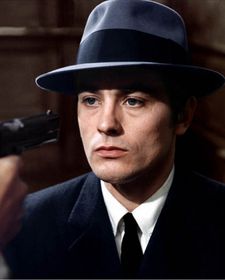 |
| A career defining performance in Jean-Pierre Melville’s The Samouraï Photo: Criterion Collection |
Delon recalls being invited to a dinner at director Clément’s house in Paris. “We were with the late Hakim brothers who were the producers as well as Clément and his wife Eva. I said I wanted the part of Ripley but they said no because I had never done anything major. Then there was silence but a voice came from the kitchen and it was Eva telling René that the ‘little guy’ was right and I should get the main part. You could not invent something like that.”
Clément also gave Delon the same advice he had received on his first film. “I was to be myself and to live in the part as I would do in my life and to speak as I speak.”
At one stage he made an abortive attempt to flirt with Hollywood in such vehicles as The Yellow Rolls Royce with Shirley MacLaine, but the reactions prompted Delon to concentrate his career with European directors
Delon has had a chequered domestic life. He divorced his first wife Nathalie in 1968 when he met actress Mireille Darc with whom he went on to share his life for 15 years. Delon also was involved with Romy Schneider with whom he co-starred in the film Christine in 1958 and with whom he went on to make Jacques Deray’s La Piscine. He was chosen from among 150 actors for the role opposite Schneider in Christine which gave the actress a whole new career in France with the likes of Claude Sautet.
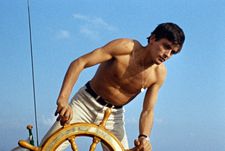 |
| Alain Delon in René Clément’s Plein Soleil Photo: UniFrance |
During the late Seventies, Eighties and Nineties Delon diversified out of the acting arena and into producing and also has founded his own company devoted to luxury goods as perfumes and wines. He has enjoyed such pet interests as horse-racing, boxing, and collecting art. He was said to have amassed a considerable personal fortune. As recognition of his status as a national icon he was awarded the Legion d’honneur.
Delon used to keep insisting that he was “not a star” but an actor of serious purpose. Early in his career he said that he had been “fighting for ten years to make people forget that I am just a pretty boy with a beautiful face. It’s a hard fight but I will win it.”
Delon considers that the impetus for leading him to cinema was simply that “it was in my head” then added with some modesty: “I suppose I had a certain talent” which as epitaphs go has certain resonance.





















